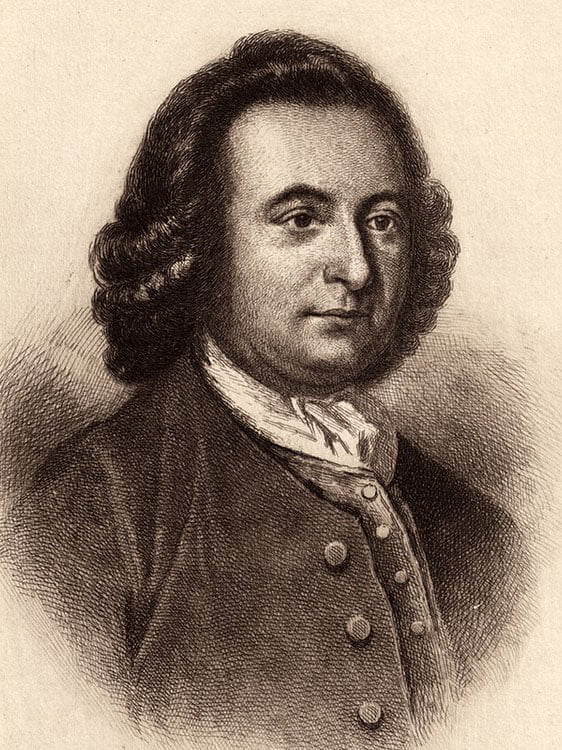
A Declaration of Rights (June 12th, 1776)
Made by the Representatives of the good People of Virginia, assembled in full and free Convention, which rights to pertain to them and their posterity as the basis and foundation of government.
I. That all men are by nature equally free and independent, and have certain inherent rights, of which, when they enter into a state of society, they cannot by any compact, deprive or divest their posterity; namely, the enjoyment of life and liberty with the means of acquiring and possessing property, and pursuing and obtaining happiness and safety.
II. That all power is vested in, and consequently derived from, the people; that magistrates are their trustees and servants, and at all times amendable to them.
III. That government is, or ought to be, instituted for the common benefit, protection and security of the people, nation, or community; of all the various modes and forms of government, that is best which is capable of producing the greatest degree of happiness and safety, and is most effectually secured against the danger of maladministration; and that, when a government shall be found inadequate or contrary to these purposes, a majority of the community hath an indubitable, unalienable and indefeasible right to reform, alter or abolish it, in such manner as shall be judged most conducive to the public weal.
IV. That no man, or set of men, are entitled to exclusive or separate emoluments or privileges from the community but in consideration of public services, which not being descendible, neither ought the offices of magistrate, legislator, or judge to be hereditary.
V. That the legislative, executive and judicial powers should be separate and distinct; and that the members thereof may be restrained from oppression, by feeling and participating the burdens of the people, they should, at fixed periods, be reduced to a private station, return into that body from which they were originally taken, and the vacancies be supplied by frequent, certain and regular elections, in which all, or any part of the former members to be again eligible or ineligible, as the laws shall direct.
VI. That all elections ought to be free, and that all men having sufficient evidence of permanent common interest with, and attachment to the community have the right of suffrage, and cannot be taxed, or deprived of their property for public uses, without their own consent, or that of their representatives so elected, nor bound by any law to which they have not in like manner assented, for the public good.
VII. That all power of suspending laws, or the execution of laws, by any authority, without consent of the representatives of the people, is injurious to their rights, and ought not to be exercised.
VIII. That in all capital or criminal prosecutions, a man hath a right to demand the cause and nature of his accusation, to be confronted with the accusers and witnesses, to call for evidence in his favor, and to speedy trial by an impartial jury of twelve men of his vicinage, without whose unanimous consent he cannot be found guilty; nor can he be compelled to give evidence against himself; that no man be deprived of his liberty, except by the law of the land or the judgment of his peers.
IX. That excessive bail ought not to be required, nor excessive fines imposed, nor cruel and unusual punishments inflicted.
X. That general warrants, whereby an officer or messenger may be commanded to search suspected places without evidence of a fact committed, or to seize any person or persons not named, or whose offence is not particularly described and supported by evidence, are grievous and oppressive, and ought not to be granted.
XI. That in controversies respecting property, and in suits between man and man, the ancient trial by jury of twelve men is preferable to any other, and ought to be held sacred.
XII. That the freedom of the press is one of the great bulwarks of liberty, and can never be restrained but by despotic governments.
XIII. That a well regulated militia, composed of the body of the people, trained to arms, is the proper, natural, and safe defence of a free State; that standing armies in time of peace should be avoided as dangerous to liberty; and that in all cases the military should be under strict subordination to, and governed by, the civil power.
XIV. That the people have a right to uniform government; and therefore, that no government separate from or independent of the government of Virginia, ought to be erected or established within the limits thereof.
XV. That no free government, or the blessing of liberty, can be preserved to any people, but by a firm adherence to justice, moderation, temperance, frugality and virtue, and by a frequent recurrence to fundamental principles.
XVI. That religion, or the duty which we owe to our Creator, and the manner of discharging it, can be directed only by reason and conviction, not by force or violence; and therefore all men are equally entitled to the free exercise of religion, according to the dictates of conscience; and that it is the duty of all to practice Christian forbearance, love and charity towards each other.
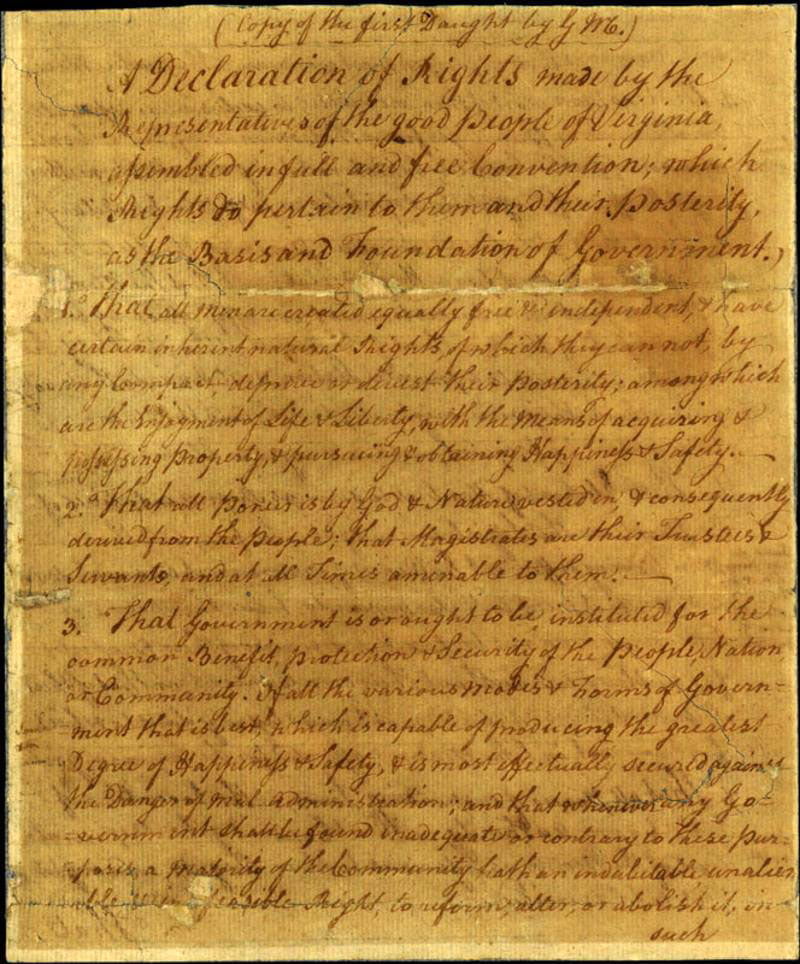
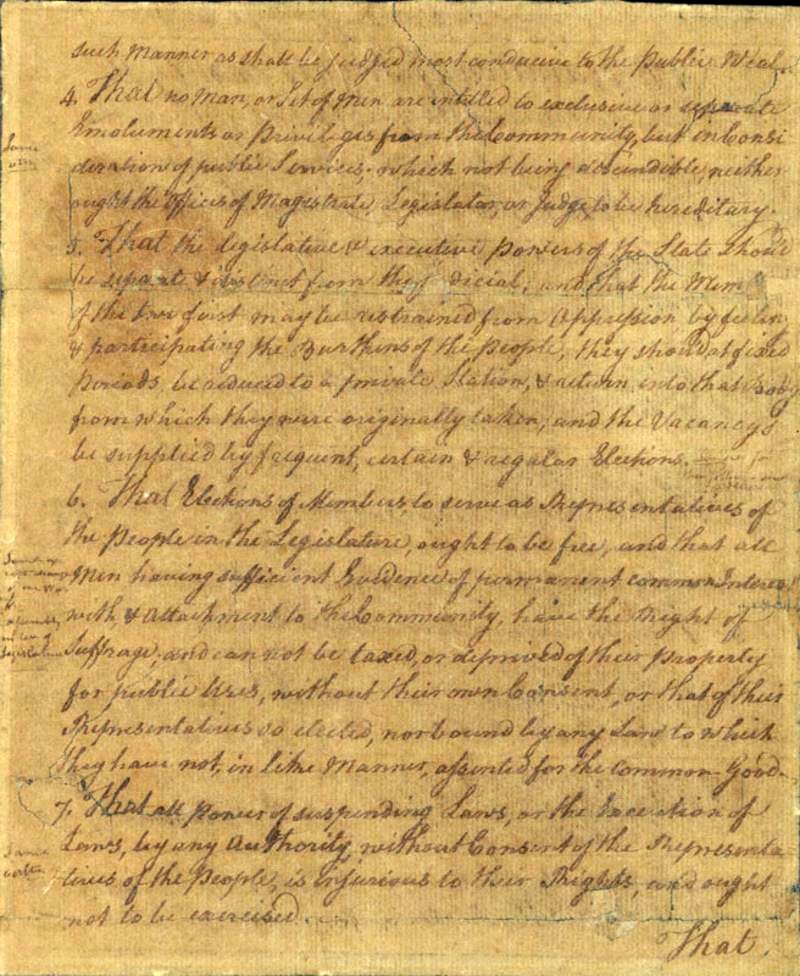
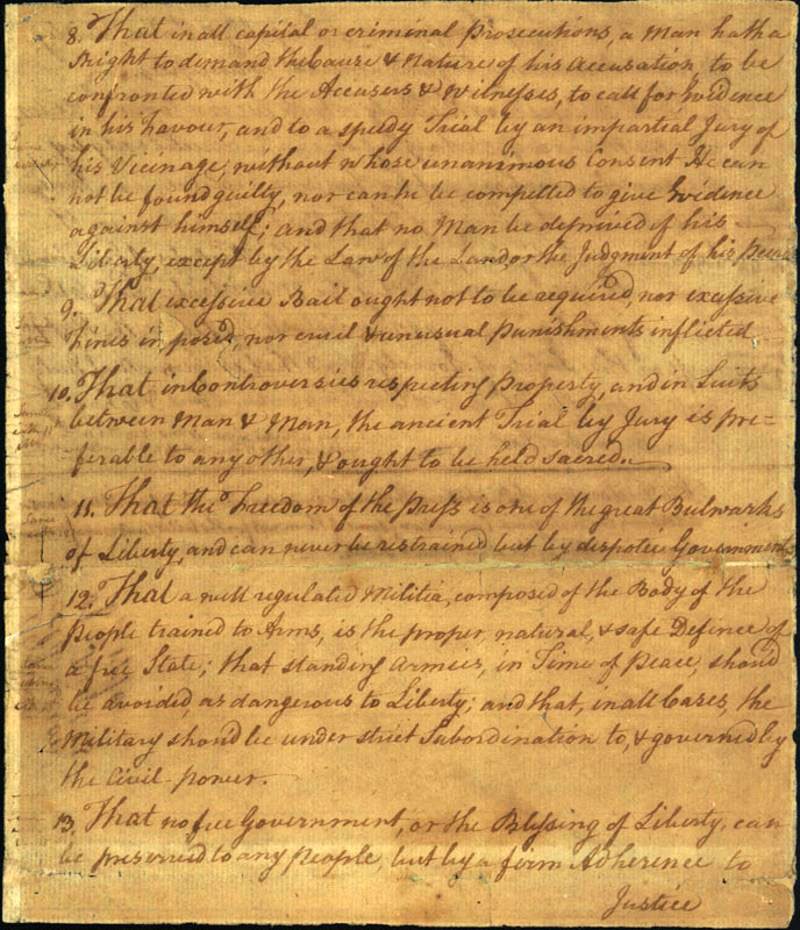
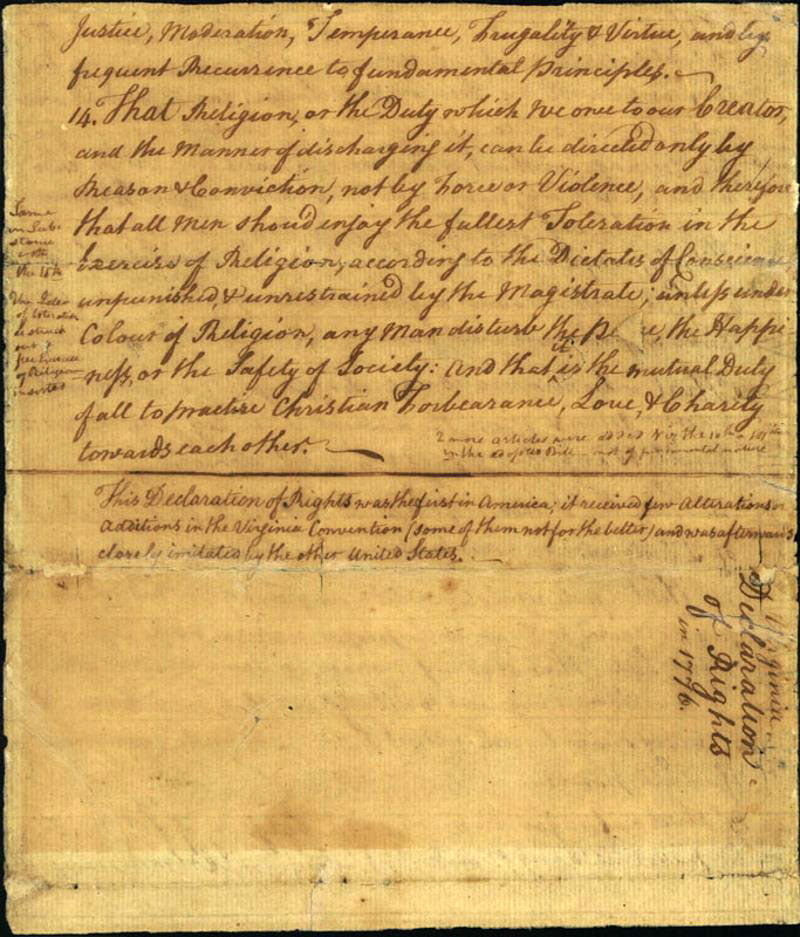
Virginia’s Legislative Information System: https://law.lis.virginia.gov/constitutionexpand/article1/, National Archives, America’s Founding Documents: https://www.archives.gov/founding-docs/virginia-declaration-of-rights, American Treasures of the Library of Congress: http://www.loc.gov/exhibits/treasures/tr00.html#obj6
Rutland, Robert Allen, 1922-, and Virginia. The Birth of the Bill of Rights, 1776-1791. Chapel Hill: Published for the Institute of Early American History and Culture by the University of North Carolina Press, 1955. https://hdl.handle.net/2027/uc1.32106001170312
Hunt, Gaillard, 1862- [from old catalog]. Virginia Declaration of Rights And Cardinal Bellarmine. [Washington, D.C.: The Catholic university of America, 1917. https://hdl.handle.net/2027/loc.ark:/13960/t9z03k64r
Grigsby, Hugh Blair, 1806-1881. The Virginia Convention of 1776: a Discourse Delivered Before the Virginia Alpha of the Phi Beta Kappa Society, In the Chapel of William And Mary College, In the City of Williamsburg, On the Afternoon of July the 3rd, 1855. Richmond: J.W. Randolph, 1855. https://hdl.handle.net/2027/nyp.33433034019335
Rowland, Kate Mason, d. 1916. The Life of George Mason, 1725-1792. New York: G.P. Putnam’s Sons, 1892. https://hdl.handle.net/2027/mdp.39015009170724
